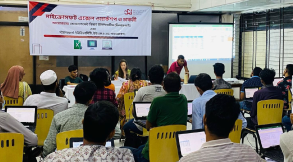The spread of modern contraception and vaccinations worldwide has been one of the greatest global public health accomplishments of the last hundred years. In this project, the researchers ask whether the resulting fall in mortality and fertility has affected industrialization. In their preliminary results, they assess the long-term impact of a quasi-experimental contraception and early-childhood vaccination program using highly detailed data. They found that the program, which reduced fertility on net, slowed down the process of industrialization as there were fewer household members to send away from the family farm to work in manufacturing.
The empirical strategy consists of three parts. First, the researchers are refining and completing their analysis of the region in Bangladesh outlined above. Second, they will analyze the effects of the expansion of the contraception and vaccine program to the entire country of Bangladesh using a quantitative macroeconomic model so as to allow for general equilibrium effects. With this model, they can conduct policy counterfactuals and separate out the role of the vaccination arm of the program from the contraception arm. Third, they are constructing a cross-country panel dataset of fertility and agricultural employment rates. With these data, they will explore whether and under what conditions lower fertility slows down industrialization.
The research will shed light on whether and how falling fertility--which is happening in virtually every developing country on Earth--slows down industrialization. With the policy counterfactuals, the research will provide evidence on the contribution of vaccines versus contraception in shaping the process of industrialization. The researchers are careful to note, however, that any slowdown of industrialization resulting from lower fertility may not be welfare reducing. In particular, households had the option to migrate from a rural agricultural region to an urban center with manufacturing but chose not to, suggesting some combination of high migration costs and low urban amenities.





















































